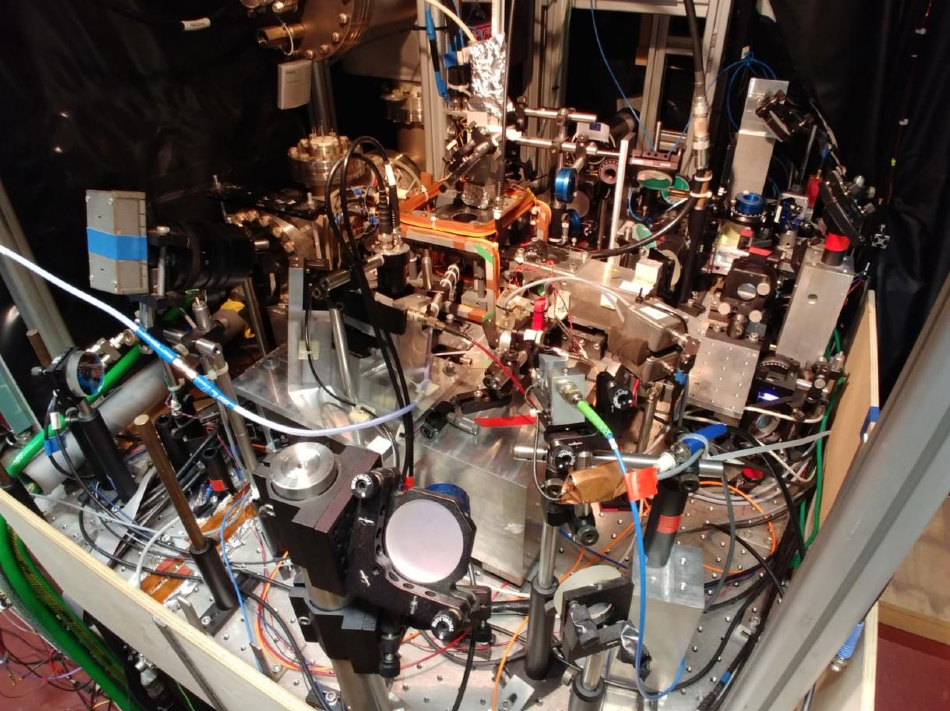Jun 23 2020
In the area of science, one main aim is to identify physical descriptions of nature by analyzing the interactions of basic system components with each other. In the case of complex many-body systems, this is achieved by often using effective theories.
 Experimental setup at the Kirchhoff Institute for Physics at Heidelberg University. Image Credit: © Alexis Bonnin.
Experimental setup at the Kirchhoff Institute for Physics at Heidelberg University. Image Credit: © Alexis Bonnin.
Such theories enable a description of these interactions without the need to observe a system on the smallest of scales. At Heidelberg University, physicists have created a new technique that enables finding such theories experimentally using the so-called quantum simulators.
The outcomes of the study, headed by Prof. Dr Markus Oberthaler (experimental physics) and Prof. Dr Jürgen Berges (theoretical physics), were reported in the Nature Physics journal.
In the case of large systems, it is almost impossible to derive predictions related to the physical phenomena at the level of individual particles from a microscopic description. This holds true not just for quantum mechanical many-body systems but also to classical physics, for example, when water heated in a cooking pot must be described at the level of its individual water molecules.
However, observation of a system on large scales, such as water waves in a pot, can make new properties relevant under specific preconditions. Effective theories are employed to efficiently describe such physics.
Our research aimed to identify these theories in experiments with the help of quantum simulators.
Torsten Zache, Heidelberg University
Zache is the primary author of the theoretical part of the study. Quantum simulators are employed to easily alter many-body systems and to estimate their properties.
Recently, the Heidelberg physicists demonstrated their new technique through an experiment on ultracold rubidium atoms, trapped in an optical trap and brought out of equilibrium.
In the scenario we prepared, the atoms behave like tiny magnets whose orientation we are able to precisely read out using new processes.
Maximilian Prüfer, Heidelberg University
Prüfer is the primary author of the experimental portion of the study. The experiment must be repeated several thousand times to identify the effective interactions of these “magnets,” and necessitates exceptional stability.
The underlying theoretical concepts allow us to interpret the experimental results in a completely new way and thereby gain insights through experiments into areas that have thus far been inaccessible through theory.
Dr Markus Oberthaler, Professor of Experimental Physics, Heidelberg University
“In turn, this can tell us about new types of theoretical approaches to successfully describe the relevant physical laws in complex many-body systems,” noted Prof. Berges.
The method employed by the Heidelberg physicists can be applied to several other systems, paving the way for an innovative territory for quantum simulations. Jürgen Berges and Markus Oberthaler believe that this new technique to identify effective theories will enable finding solutions to fundamental questions in physics.
The study was performed under the guidance of the “Isolated Quantum Systems and Universality In Extreme Conditions” Collaborative Research Centre (ISOQUANT) of Heidelberg University. It also forms part of the “Entanglement Generation in Universal Time Dynamics” project, for which Prof. Oberthaler was awarded an ERC Advanced Grant from the European Research Council (ERC).
Journal Reference:
Prüfer, M., et al. (2020) Experimental extraction of the quantum effective action for a non-equilibrium many-body system. Nature Physics. doi.org/10.1038/s41567-020-0933-6.